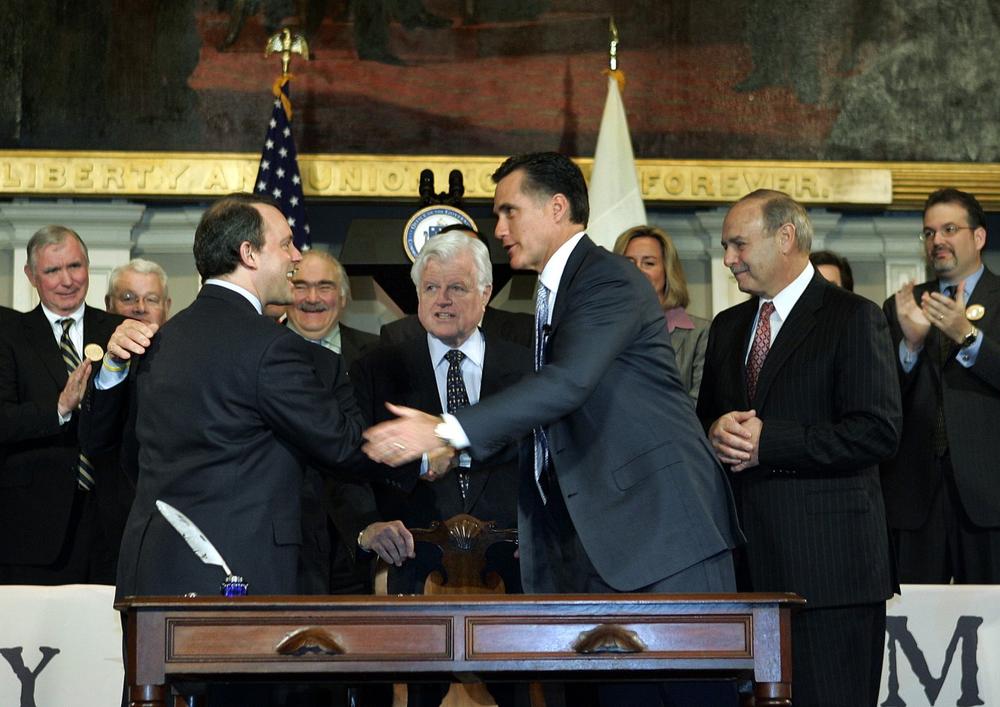Advertisement
Massachusetts As Model: Can The Nation Afford Health Reform?

When Massachusetts elects a new U.S. senator in January, that person could end up voting on the national health care reform bill being debated in Congress. The proposal is being modeled in part after the health reform law passed here in 2006 — and three years later, the state is still grappling with some of the details.
This is the first in a two-part series on the key political lessons of Massachusetts’ health care reform law, as WBUR’s Sacha Pfeiffer and Karen Brown of member station WFCR in western Massachusetts team up to look at the issue of affordability.
Urban Vs. Rural Reform
Whichever candidate lands in Congress is going to have to represent urban and rural viewpoints on health care reform.
When people debate the status of Massachusetts health reform, the key question tends to be: Is it affordable? More than 97 percent of all people in the state now have health insurance. Some of them get it through state-subsidized health plans, but those subsidies cost nearly a billion dollars a year.
Some critics say that has come at the expense of other needs, one of them being the state's safety net hospitals. Those are the hospitals that serve mostly poor patients, and many of them are in western Massachusetts and other places outside Boston.
There are safety net hospitals in the Boston area, too, such as Boston Medical Center and Cambridge Hospital. They rely on reimbursement from the state to help pay for the subsidized care they provide, just like all the other safety net hospitals.
Advertisement
Part 2: Does Insurance Ensure Access?
But the hospitals in western Massachusetts say they get even less state aid than those in Boston. In fact, they have just filed a lawsuit on that very matter. People like Hank Porten, president of Holyoke Medical Center, say the hospitals are having a hard time serving their patients.
"If you're in a community that is not in dealing with the poor quotients that we do, then health care reform may be good for you," Porten says. "But for communities that are heavily supporting the poor, the formula is not working."
Reimbursements For Medicaid Patients
Part of the formula that Porten is talking about is how much doctors and hospitals get reimbursed for their Medicaid patients. As the economy has nose-dived, the state has reduced those reimbursements. So a hospital like Holyoke Medical Center, which has more than 70 percent Medicaid patients, has had to cut services and staff.
Some health care reformers say it's better that patients have insurance than show up at the hospital uninsured. Hank Porten disagrees with them.
In the past, uninsured patients were covered by a special state fund that Porten says paid better than Medicaid. The problem now, he says, is that the state is spending so much for insurance plans for the low- and moderate-income residents that there's very little money leftover for hospitals like his.
So Porten's main advice to anyone who wants to replicate this system is to make sure there's enough money to go around from the get-go.
Otherwise, he says, "you're going to start causing big cracks in the system: physicians will leave, and hospitals will have to close services. So there has to be some continuity in how you're going to fund this."
Of course, there are plenty of people in Massachusetts who don't think health reform is a money drain. When you ask Jon Kingsdale how state health reform is going, he says it's been a huge success. Kingsdale runs the Connector, which oversees the state's reform effort.
"There is a myth that covering most people in Massachusetts has been unaffordable," Kingsale says. "I underscore the word myth because I think it is, frankly, a politically motivated attack on national health reform that is almost fact-free."
Kingsdale says the cost of Massachusetts health reform is only about 1 percent of the state budget — hardly a budget buster. And he blames the recession for making health reform feel like more of a financial burden than it should.
Cover First, Figure It Out Later
There's also the problem that health care costs keep going up. That adds to the burden on the state and also on individuals who buy insurance.
So Massachusetts created a special commission that's looking into ways to cut those costs. One of its proposals is that doctors get a fixed amount of money each year to spend per patient. Kingsdale says that shows that health reform is a work in progress.
"Inevitably, a major bill on national reform will lead to a series of additional legislation to do mid-course corrections and improvements as we go along," he says. "We've seen that in Massachusetts.
It's probably worth noting that the state hasn't done any payment reforms yet, and no one thinks that's going to happen easily. In the meantime, the state is cutting some of the benefits it started with, like dental full health care for legal immigrants, and it's increasing co-pays for its state plans.
But Kingsdale says in the meantime it's important to get health insurance for as many people as possible. That's the lesson he thinks Washington should take from Massachusetts: Cover people first, then figure out how to pay for all that coverage.
Congress is trying to figure out how to do both of those at once — and you can see how hard that is from the heated debate happening on Capitol Hill.
This program aired on December 1, 2009.